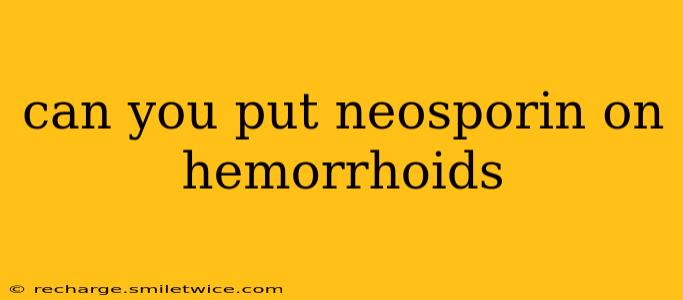Can You Put Neosporin on Hemorrhoids? A Comprehensive Guide
Hemorrhoids, those painful and often embarrassing swollen veins in the anus and rectum, can leave you searching for quick relief. Many turn to readily available over-the-counter remedies like Neosporin, hoping for soothing relief. But is this a safe and effective practice? Let's delve into the question: Can you put Neosporin on hemorrhoids?
The short answer is: it's generally not recommended to apply Neosporin directly to hemorrhoids. While Neosporin (a triple antibiotic ointment containing neomycin, polymyxin B, and bacitracin) is effective against bacterial infections on external wounds, its application to hemorrhoids presents several potential drawbacks.
Why Neosporin Might Not Be the Best Choice for Hemorrhoids
-
Potential for Allergic Reaction: Some individuals are allergic to one or more components of Neosporin. Applying it to the sensitive skin around the anus can lead to irritation, itching, rash, or even a more severe allergic reaction.
-
Delayed Healing: The moist environment created by hemorrhoids, combined with the ointment, can hinder the healing process. Neosporin's occlusive nature can trap moisture and prevent the area from properly breathing, potentially leading to increased discomfort and even secondary infection.
-
Ineffectiveness Against the Root Cause: Hemorrhoids are primarily caused by increased pressure in the veins of the rectum and anus. Neosporin addresses bacterial infections, not the underlying vascular issue. Applying it won't address the root cause of the problem.
-
Risk of Infection: While Neosporin fights infection, improperly cleaning the affected area before application can actually introduce bacteria, worsening the situation.
What are the better options for treating hemorrhoids?
Instead of relying on Neosporin, consider these approaches for hemorrhoid relief:
-
Over-the-counter creams and ointments: Many hemorrhoid-specific creams and ointments contain ingredients that reduce pain, swelling, and itching. Look for products containing hydrocortisone (for inflammation) or lidocaine (for pain relief). Always follow the instructions on the packaging.
-
Sitz baths: Soaking in warm water (a sitz bath) can help soothe the inflamed area and promote healing.
-
Lifestyle changes: Maintaining a high-fiber diet, increasing fluid intake, and regular exercise can help prevent future occurrences.
-
Medical intervention: For severe or persistent hemorrhoids, a doctor might recommend rubber band ligation, sclerotherapy, or surgical removal.
Does Neosporin help with any hemorrhoid-related issues?
While not directly treating the hemorrhoid itself, Neosporin might be considered if a secondary bacterial skin infection develops around the hemorrhoid, resulting in a separate wound. However, it's crucial to consult a doctor to determine the cause of the infection and the best course of action. Self-treating can delay proper medical care.
What if I already applied Neosporin?
If you've already applied Neosporin and experience any adverse reactions (like increased irritation, allergic reaction, or worsening symptoms), discontinue use immediately and consult a healthcare professional.
Other frequently asked questions about hemorrhoids:
What causes hemorrhoids? Hemorrhoids result from increased pressure on the veins in the rectum and anus. This can be caused by chronic constipation, straining during bowel movements, pregnancy, obesity, and prolonged sitting or standing.
How can I prevent hemorrhoids? Maintain a high-fiber diet, drink plenty of fluids, exercise regularly, and avoid prolonged straining during bowel movements.
When should I see a doctor about hemorrhoids? Seek medical attention if you experience severe pain, bleeding, significant swelling, or symptoms that don't improve with home remedies.
Remember, this information is for general knowledge and does not constitute medical advice. Always consult a healthcare professional for diagnosis and treatment of any medical condition.
